 Health
Health
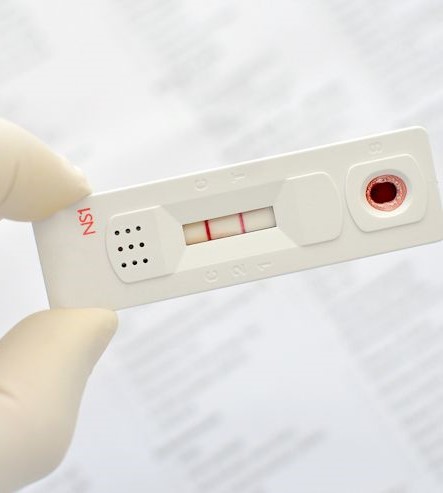
Numbers of Chikungunya cases growing
 (CNS): As concerns grow around the world about the possible spread of the deadly Ebola virus, Cayman is struggling to keep a lid on the chikungunya virus, as the total number of confirmed cases reached 20 this week. Although no new local transmissions were confirmed in the latest results, there was a surge in suspected cases at the hospital, which is now awaiting 28 results. Most of the people who have contracted the virus have done so in in the neighbouring island of Jamaica, where the illness is now endemic. As a result, Dr Kiran Kumar, the Medical Officer of Health, is pleading with the public to practice protective measures against mosquito bites.
(CNS): As concerns grow around the world about the possible spread of the deadly Ebola virus, Cayman is struggling to keep a lid on the chikungunya virus, as the total number of confirmed cases reached 20 this week. Although no new local transmissions were confirmed in the latest results, there was a surge in suspected cases at the hospital, which is now awaiting 28 results. Most of the people who have contracted the virus have done so in in the neighbouring island of Jamaica, where the illness is now endemic. As a result, Dr Kiran Kumar, the Medical Officer of Health, is pleading with the public to practice protective measures against mosquito bites.
These include using mosquito repellent with DEET on the skin, and wearing long sleeve pants and shirts when outside during times that mosquitoes bite, whether in the Cayman Islands or on travels.
In the latest update fromthe public health department, officials confirmed that the number of locally transmitted cases remains at four with the other 16 confirmed cases all contracted overseas, including ten in Jamaica, three in Guyana, two in the Dominican Republic and one patient picked up the virus in St Lucia.
The patients are residents of four different districts: three in Cayamn Brac, five in West Bay and Bodden Town; seven people living in George Town have also contracted the illness.
28 results are still outstanding from Caribbean Public Health Agency (CARPHA), which is where the HSA is sending blood samples from patients who are suspected to have picked up the virus.
The chikungunya virus is transmitted by Aedes aegypti mosquitoes biting infected persons during the first week of illness. It causes fever, severe joint pain, muscle pain, headache, nausea, fatigue and rash. Officials urge anyone who may be experiencing these symptoms to immediately see a healthcare provider.
As at 6 October over 13, 000 cases have been reported from 33 regional countries.
Further information can be obtained through www.hsa.ky. Regional updates can be accessed by visiting the CARPHA website onhttp://carpha.org/What-We-Do/Public-Health-Activities/Chikungunya. In addition United States updates are available from the Centers for Disease Control and Prevention on http://www.cdc.gov/chikungunya/geo/united-states.html.

Onus on insurer in disputes
(CNS): If a health insurance provider refuses to cover a medical procedure on the grounds that it was not medically necessary, the onus is on the insurance company to prove it, according to Superintendent of Health Insurance Mervyn Conolly. The regulations in the health insurance law outline what is 'medically necessary', however, there are instances where the healthcare provider and the insurance provider may not see eye-to-eye concerning the diagnosis and treatment of the patient, Conolly told CNS, but in those cases the Health Insurance Commission (HIC) always puts the onus on the insurance provider to justify why that particular procedure is not medically necessary and to prove, with evidence to support their claims, that the care provided was really for the comfort and convenience of the patient or that it was not the appropriate level of treatment of that procedure.
“Then that is something that we would take up with the healthcare provider,” he said, “but we are usually able to work through most of those complaints without it escalating any further.”
In an instance of a true emergency where the healthcare provider has to provide treatment at that point of time, it is usually not contested by the insurer, Conolly explained. “It is usually the elective procedures that are planned where you could have those concerns as to whether it was medically necessary or not,” he said.
In these cases the doctor would generally seek a pre-certification from the insurance regarding the surgery or procedure that they are planning to carry out so that the insurer has the opportunity to look at it before they actually receive the claim, and if there any concerns they will then contact the healthcare provider, usually 24 to 48 hours before the procedure is actually carried out.
“Again, the onus is on the insurance provider to prove that it is not medically necessary,” Conolly stressed. “I can't recall too many instances where, once we put the facts together, that the insurance providers have not supported it.”
The approved insurers have their own medical consultants that they use to defend their position on the matter, he said. “In that case, you would have the medical consultants speaking directly to the physician, and a lot of cases are resolved in that way.”
He added, “The last thing we want to see is that the patient is negatively affected under these circumstances. In other words, if the medical procedure is necessary we want to defend that person.”
The Health Insurance Commission now has the power to impose administrative fines up to $1,000 for both employers and insurance companies for infractions of the health insurance law. If the accused person or company wants to challenge the HIC decision or if the matter is not resolved administratively, it will still end up in court but if it escalates to this level, the offender could end up with a much bigger fine imposed by the magistrate – up to $30,000 in some cases
The new powers given to the HIC, which kicked in at the beginning of this month, gives teeth to the commission for the first time. Conolly said they like to resolve cases before they get to the point where there is no cooperation and they end up in court, so having the administrative fines available as an additional tools to resolve matters is very useful. Only about 20% of cases end up in court, he noted, and they hope that these new powers will reduce that.
The HIC receives complaints about insurance providers not paying all the time, he said. The commission will then look at the benefit plans that that complainant has and assess the benefits that individual is entitled to under the contract. Ninety-five per centof the time they are able to resolve the matter, he said.
“Where the insurer is clearly not honoring the contract, in those cases we will definitely decide in favor of the insured person and require the insurer to honour the contract,” he maintained.
However, he said that in about half the cases taken to the commission it's because the insured people don't understand what benefits they are entitled to. He said that very often people don’t even read their plan of benefits. “And it's only when they go to the healthcare provider that they realize that they are not covered under the benefits, or if they are, they find that they are not covered to the level that they expected.”
Related articles on CNS Business:
$1,000 fines for health insurance offences
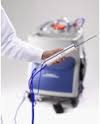
Cancer charity donates biopsy machine to HSA
 (CNS): The George Town hospital a $55k CUROS Vacuum Assisted Biopsy machine as a result of a donation from the Cayman Islands Cancer Society (CICS). The machine allows for both ultrasounds and biopsies to be performed at the same time and in a less invasive manner. The procedure can be done on any tumour that is visible to the eye and does not disfigure the breast. The machine uses a needle that is inserted under the tumour which makes an incision and takes a biopsy of the tumour or lump. When the needle is moved around it takes multiple samples and in some cases can actually remove the entire tumour.
(CNS): The George Town hospital a $55k CUROS Vacuum Assisted Biopsy machine as a result of a donation from the Cayman Islands Cancer Society (CICS). The machine allows for both ultrasounds and biopsies to be performed at the same time and in a less invasive manner. The procedure can be done on any tumour that is visible to the eye and does not disfigure the breast. The machine uses a needle that is inserted under the tumour which makes an incision and takes a biopsy of the tumour or lump. When the needle is moved around it takes multiple samples and in some cases can actually remove the entire tumour.
The CVAB machine has already, and will continue, to help with early diagnosis of breast cancer, health officials stated.
From the initial visit to receiving the results this process can take about two weeks much shorter than before the CVAB machine was available. Before the donations patients would have to wait for an available time and day for the operating room in order to have the biopsy taken, health officials explained but the CVAB allows for the procedure to be less invasive, without the use of general anaesthetic and is usually completed within a half hour to an hour. CVAB procedure allows patients to return to work the same day.
In the two months that the CVAB machine has been in use, there have been twelve biopsies, of which three were diagnosed with cancer. The CVAB machine allows for faster turnaround between sampling and results, leading to earlier diagnosis. It also provides a more accurate sample and picture with no distortion.
In 2006, the CICS raised funds to form the Cancer Care Fund, which ultimately brought the first digital mammogram machine in the Caribbean to the HSA. Since the fund was established the Cancer Society has been able to donate a camera, a microscope, wet prep set up for PAP smear examinations and now the CVAB. The cost of the CVAB machine was $55,065, all of which was paid for by the Cancer Society with funds from the Cancer Care Fund.
“The teamwork between the HSA and the Cancer Society has proven to making the process at the Cayman Islands HSA more efficient,” said Dr Bogle-Taylor. “The HSA identifies specific cancer related equipment that is a priority to improving healthcare and when the equipment is necessary, funds from the Cancer Care Fund can be used to make those purchases. The Cancer Care Fund has also been utilised to purchase a new microscope with digital camera for the HSA laboratory, so pap tests can be performed creating electronic images, which can be used with medical files as needed.”
Mammograms, MRIs and ultrasounds are some of the other tools used in cancer diagnosis. Every time a mammogram is performed, a portion of the medical fee is put towards the Cancer Care Fund which is used for machine upgrades, staff training, and the procurement of cancer related equipment. Every time a woman gets her mammogram at the HSA, she is helping the CICS contribute to the Cancer Care Fund.
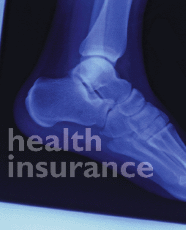
Medicare-type health insurance being proposed
 (CNS Business): Employers are compelled under the law to provide workers with health insurance through one of the Cayman Islands’ approved insurance providers, but after retirement many employees are finding that they are without coverage. However, the Health Insurance Commission (HIC) is currently working on a proposal for government for a retirement health insurance plan similar to Medicare in the US that people would pay into while they worked and would cover them in their golden years. Some companies do provide for their past employees who have retired by allowing them to remain in their group insurance package, according to Superintendent of Health Insurance Mervyn Conolly. Unfortunately, he said, that is not the norm. Read more and comment on CNS Business
(CNS Business): Employers are compelled under the law to provide workers with health insurance through one of the Cayman Islands’ approved insurance providers, but after retirement many employees are finding that they are without coverage. However, the Health Insurance Commission (HIC) is currently working on a proposal for government for a retirement health insurance plan similar to Medicare in the US that people would pay into while they worked and would cover them in their golden years. Some companies do provide for their past employees who have retired by allowing them to remain in their group insurance package, according to Superintendent of Health Insurance Mervyn Conolly. Unfortunately, he said, that is not the norm. Read more and comment on CNS Business
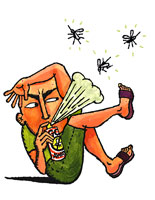
Three new local cases of chikungunya confirmed
 (CNS): Despite weeks of managing to contain the chikungunya virus which is spreading rapidly through the Caribbean, public health officials confirmed three more local transmissions on Thursday. Since June when Cayman recorded its first case in a patient with a travel history to an endemic country there had been just one local transmission. However 11 blood samples sent to the Caribbean Public Health Agency earlier this month have been confirmed as positive and three of those patients have no travel history indicating that they were infected here in Cayman. Dr Kiran Kumar, the medical officer of health urged residents to take protective action.
(CNS): Despite weeks of managing to contain the chikungunya virus which is spreading rapidly through the Caribbean, public health officials confirmed three more local transmissions on Thursday. Since June when Cayman recorded its first case in a patient with a travel history to an endemic country there had been just one local transmission. However 11 blood samples sent to the Caribbean Public Health Agency earlier this month have been confirmed as positive and three of those patients have no travel history indicating that they were infected here in Cayman. Dr Kiran Kumar, the medical officer of health urged residents to take protective action.
The public health boss said the public needed to take protective measures such as using mosquito repellents containing DEET on skin, and wearing long- sleeved shirts and long pants tucked into socks when outdoors during times that the Aedes aegypti mosquito is biting, which he said was between 7.00-9.00 am and between 4.00 and 6.00pm.
Dr Bill Petrie, Director of the Mosquito Research Control Unit said eliminating breeding sites was key to combatting the disease.
“We encourage residents to clean-up their yards and remove or turn over any items that may hold water, such as buckets, and in this way eliminate potential breeding sites for this mosquito.” Dr Petrie said. He added that the MRCU has already stepped-up control operations, to include aerial spraying, which will continue in West Bay this afternoon; vehicle-mounted fogging and hand-held fogging; as well as continuing to inspect and treat yards and premises.
Health officials who learned of the 11 positive cases on Wednesday evening said that they will be Officials meeting Friday 3 October to review control measures.
“Eight had travel history to other Caribbean countries prior to becoming ill,” said Dr Kumar. “Six had travelled to Jamaica, one to St Lucia and the other to Guyana, while three had no travel history, which means those were cases of local transmission,” he added.
Chikungunya is a viral disease transmitted by the Aedes aegypti mosquito, it causes fever, severe joint pain, muscle pain, headache, nausea, fatigue and rash. Officials urge anyone who may be experiencing these symptoms to immediately see a healthcare provider.
Osbourne Bodden, the health minister said that although officials have some concerns regarding the transmission of chikungunya, the Public Health Department, and Mosquito Research and Control Unit were actively collaborating to ensure the containment. Echoing Dr Kumar’s comments, the minister pressed the point about that people needed to protect themselves from mosquito bites and to assist MRCU by eliminating breeding sites in and around homes. He also promised that the Ministry of Health, the Public Health Department and MRCU will continue to update the public throughout this process.
Since the last update on 22 September 2014, 10 new cases were placed under investigation during the week of 23-29 September 2014. The eleven patients who tested positive (16-24) September are residents of George Town (4) West Bay (4) Bodden Town (2) and Cayman Brac (1) .
Their onset of symptoms took place between 16-22 September so they are no longer considered infectious, as it has been more than a week. The chikungunya virus is transmitted by mosquitoes biting infected persons during the first week of illness.
The first case of chikungunya in the Cayman Islands was reported at the end of June and with the latest results 56 cases of chikungunya have now been investigated and 48 results have been received. Eighteen have come back positive four of which are believed to be local transmissions, 28 were negative and two inconclusive. Results of 8 blood samples are still outstanding.
As at 29 September, 12,720 cases of chikungunya have been reported across the region. Further information can be obtained through www.hsa.ky. Regional updates can be accessed by visiting the CARPHA website on http://carpha.org/What-We-Do/Public-Health-Activities/Chikungunya. In addition United States updates are available from the Centers for Disease Control and Prevention on http://www.cdc.gov/chikungunya/geo/united-states.html
See information sheets below

Jamaica announces details for proposed ganja laws
 (CNS): Jamaica’s justice minister has revealed more details of the proposed new ganja laws that will pave the way for the legal cultivation, possession, import and export, transportation, manufacture, sale, and distribution of ganja for medical and scientific purposes. With the liberalization of ganja use the Jamaican government is positioning the country to take advantage of the economic gains from the plant as its lawful consumption, especially as a medicine, takes off around the world. The production and sale of the drug will require a license and Mark Golding explained, Wednesday, that the terms of those licenses will now be determined.
(CNS): Jamaica’s justice minister has revealed more details of the proposed new ganja laws that will pave the way for the legal cultivation, possession, import and export, transportation, manufacture, sale, and distribution of ganja for medical and scientific purposes. With the liberalization of ganja use the Jamaican government is positioning the country to take advantage of the economic gains from the plant as its lawful consumption, especially as a medicine, takes off around the world. The production and sale of the drug will require a license and Mark Golding explained, Wednesday, that the terms of those licenses will now be determined.
"We need to now flesh out the specifics of the licence and framework to go hand-in-hand once the amendments have been approved and implemented,” he said.
A licensing authority is to be established to govern the processes for what is expected to be a significant industry for Jamaica. Golding also said that some revenue generated by the licensing of the ganja industry will be used to fund public education programmes directed at discouraging ganja use by adolescents and other vulnerable persons. The cash will also be used for drug-abuse support; funding scientific research into the medical and other specific uses of ganja; as well as for providing additional support for the implementation of a new regulatory regime.
"Our objective is to lay the foundations for the establishment of regulatory regimes to govern the cultivation and use of ganja for medical and scientific purposes as well as (non-medical) industrial hemp," he said.
Under the legislative changes taking place in Jamaica regarding ganja possession of two ounces or less is now a non-arrestable, ticketable infraction that does not result in a criminal record; possession for religious use is permitted as well as therapeutic purposes as prescribed by a medical practitioner, and scientific research conducted by accredited institutions.
“The medicinal potential of extracts from both ganja and hemp is also recognized as having great economic potential,” Golding said as he outlined the emerging new legislative landscape in the country.
“Jamaica is well positioned to be a forerunner in conducting research which will address the safety and efficacy issues related to extracts of medical cannabis. This research is fundamental to the development of new medicines and therapies derived from ganja and hemp.”
Meanwhile, Cayman’s legislators have remained opposed to any changes regarding the use of ganja for medical or any other purposes. The local draconian laws, where consumption and even minuscule amounts can lead to prosecution, have led to hundreds of Caymanians being saddled with criminal records because of past ganja convictions.

Shetty hospital begins local stroke study
 (CNS): People aged 65 and over are being asked to take part in a health screening study which will be conducted by doctors at the new hospital in East End to protect against stroke or Atrial Fibrillation in the elderly population. Health City Cayman Islands is looking for over 3,000 people to take part and the free screenings will be taking place around the Cayman Islands throughout October. The tests are non-invasive and powered by an iPhone app that reads pulse vibrations. They will takes under 10 minutes to complete and will help Cayman’s older population become aware of their risk of having a stroke.
(CNS): People aged 65 and over are being asked to take part in a health screening study which will be conducted by doctors at the new hospital in East End to protect against stroke or Atrial Fibrillation in the elderly population. Health City Cayman Islands is looking for over 3,000 people to take part and the free screenings will be taking place around the Cayman Islands throughout October. The tests are non-invasive and powered by an iPhone app that reads pulse vibrations. They will takes under 10 minutes to complete and will help Cayman’s older population become aware of their risk of having a stroke.
The information from the screenings will be used to compile a history-making study, called the Cayman Islands Atrial Fibrillation for Elderly (CAFE) study, which is the first of its kind in the Cayman Islands and Caribbean, the hospital stated in a release this week about the planned medical research. The screening is expected to empower people so that they understand their own potential risk for having a stroke and make Cayman a leader in the region in stroke prevention, doctors said.
Dr Ravi Kishore, Chief Interventional Cardiologist and Electrophysiologist at Health City Cayman Islands, explained that many people do not show any outward signs that they have a higher stroke risk, hence the need for this important study.
“We will be screening for Atrial Fibrillation (Afib), otherwise known as arrhythmia, which is an abnormality of the rate or rhythm of the heart. It can beat too fast, too slow or in an irregular fashion. Often people don’t realise that they have Afib, but the condition needs to be diagnosed because it can lead to a stroke,” he said.
Dr Kishore explained that there are millions of people around the world with Afib, with 2010 estimated numbers globally running at 33.5 million for men and 12.6 million for women, so it is a huge problem world-wide. Major risk factors for developing Afib include; if a person is aged over 65, if they suffer from high blood pressure, if they have coronary artery disease, heart failure, valvular heart disease or congenital heart disease. Other risk factors include if a person suffers from sleep apnea, hyperthyroidism (too much thyroid hormone), obesity or diabetes. In addition, if they suffer from lung disease, have a family history of Afib or have a history of smoking and alcohol abuse, then they are more likely to suffer from Afib.
Dr Irka Ebanks, who will be leading the research study and screenings, said it was extremely important to screen people because AFib does not have obvious warning signs.
“When symptoms do occur, they often include palpitations, chest pain/tightness, dizziness, breathlessness, fatigue or lack of energy,” she said. “These symptoms do not always immediately indicate Afib, so screening people means patients themselves may be better equipped to understand the warning signs and at the same time we will have the information we need to help diagnose the condition in a more timely manner.
“Speed is of the essence in such a case: the sooner a patient receives medical care following a stroke the better the prognosis,” the doctor added.
For more information call 1 (345) 945-4040 or visit healthcity.ky
Related article on CNS Business:
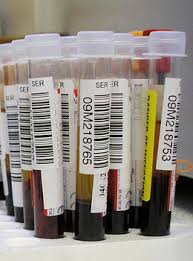
Cayman records 7th case of chikungunya
 (CNS): Another case of the mosquito borne chikungunya virus has been confirmed in a patient with a travel history to Jamaica. Despite two new cases over the last two weeks neither were locally transmitted. Although blood samples from ten new suspected cases have been sent to Trinidad this week for testing and the Medical Officer of Health, Dr. Kiran Kumar said the Cayman Islands was still managing to contain the outbreak which is now impacting more than 30 countries in the region.
(CNS): Another case of the mosquito borne chikungunya virus has been confirmed in a patient with a travel history to Jamaica. Despite two new cases over the last two weeks neither were locally transmitted. Although blood samples from ten new suspected cases have been sent to Trinidad this week for testing and the Medical Officer of Health, Dr. Kiran Kumar said the Cayman Islands was still managing to contain the outbreak which is now impacting more than 30 countries in the region.
“As the onset of symptoms of the locally acquired case was on 11 July we feel that we have been able to contain the outbreak through an integrated approach. That includes the Public Health Department, Mosquito Research and Control Unit, and the community efforts.”
Urging the public to take protective measures against mosquito bites during travel abroad but also within the Cayman Islands, he added: “We cannot afford to become complacent. We will continue to have imported cases as we are in the midst of the regional outbreak.”
Samples continue to be sent to the Caribbean Public Health Agency (CARPHA) in Trinidad for testing and four other results received this week were negative. The patient who tested positive for the virus is a resident of George Town, who had recently returned from Jamaica. The onset of symptoms took place on 13 September and he is no longer considered infectious. The chikungunya virus is transmitted by mosquitoes biting infected persons during the first week of illness.
Since Cayman’s first confirmed case in June 46 possible cases have been investigated and seven have been confirmed with only one case confirmed in a patient with no travel history to a country where the virus as caught a hold.
While 11 test results remain outstanding after ten samples were sent this week alone, 26 of the 35 results received have been negative and two were inconclusive. Results of 10 blood samples sent on 22 September are still outstanding and one from those sent the week before.
Of the seven confirmed cases, six had travelled to Dominican Republic, Guyana and Jamaica and only one patient was infected locally. Distribution of all confirmed cases include 3 from George Town, two from Cayman Bracand one in West Bay, the local patient was a resident of Savannah in Bodden Town.
Almost 11,000 cases have been reported around the Caribbean since the vcirus emerged in this region.
Further information can be obtained through www.hsa.ky. Regional updates can be accessed by visiting the CARPHA website on http://carpha.org/What-We-Do/Public-Health-Activities/Chikungunya. In addition United States updates are available from the Centers for Disease Control and Prevention on http://www.cdc.gov/chikungunya/geo/united-states.html.

No sign of new Chikungunya cases
(CNS): Cayman’s continuing efforts to contain the Chikungunya virus as it spreads across the region are still working as there have now been no new cases for more than six weeks. Despite suspected blood samples being sent to the Caribbean Public Health Agency (CARPHA) in Trinidad on a weekly basis the total number of cases in Cayman remains at five. Public health officials received two test results this week which were both negative and sent a further three for testing. So far 31 samples since Cayman’s first case in June have been tested. Only five cases have been positive, one inconclusive and 22 were negative and just three samples sent Monday are outstanding.
To date,9,640 confirmed and probable cases of chikungunya have been reported in 31 countries across the region.
More information can be obtained through www.hsa.ky and regional updates can be accessed by visiting the CARPHA website on http://carpha.org/What-We-Do/Public-Health-Activities/Chikungunya. In addition United States updates are available from the Centers for Disease Control and Prevention onhttp://www.cdc.gov/chikungunya/geo/united-states.html
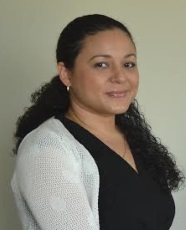
First Caymanian doctor hired at Health City
 (CNS Business): A former head girl at John Gray High School is the first Caymanian physician to work at Health City Cayman Islands (HCCI). The private hospital which, it is hoped, will launch medical tourism as the third leg of the Cayman economy, opened its doors in February this year and Dr Irka Lashany Ebanks from West Bay started work there 1 September, after finishing her internship in Jamaica last June. Having been away for five years taking her medical degree at the University of the West Indies, Dr Ebanks said she missed home and wanted to come back for a while. “I’m not 100% sure what I want to specialize in and wanted to get my feet wet in Cayman and see what area called me, see what I liked the most,” she explained. Read more on CNS Business
(CNS Business): A former head girl at John Gray High School is the first Caymanian physician to work at Health City Cayman Islands (HCCI). The private hospital which, it is hoped, will launch medical tourism as the third leg of the Cayman economy, opened its doors in February this year and Dr Irka Lashany Ebanks from West Bay started work there 1 September, after finishing her internship in Jamaica last June. Having been away for five years taking her medical degree at the University of the West Indies, Dr Ebanks said she missed home and wanted to come back for a while. “I’m not 100% sure what I want to specialize in and wanted to get my feet wet in Cayman and see what area called me, see what I liked the most,” she explained. Read more on CNS Business